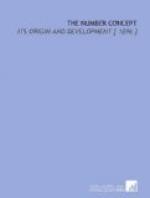While considering the extent of the savage’s arithmetical knowledge, of his ability to count and to grasp the meaning of number, it may not be amiss to ask ourselves the question, what is the extent of the development of our own number sense? To what limit can we absorb the idea of number, with a complete appreciation of the idea of the number of units involved in any written or spoken quantity? Our perfect system of numeration enables us to express without difficulty any desired number, no matter how great or how small it be. But how much of actually clear comprehension does the number thus expressed convey to the mind? We say that one place is 100 miles from another; that A paid B 1000 dollars for a certain piece of property; that a given city contains 10,000 inhabitants; that 100,000 bushels of wheat were shipped from Duluth or Odessa on such a day; that 1,000,000 feet of lumber were destroyed by the fire of yesterday,—and as we pass from the smallest to the largest of the numbers thus instanced, and from the largest on to those still larger, we repeat the question just asked; and we repeat it with a new sense of our own mental limitation. The number 100 unquestionably stands for a distinct conception. Perhaps the same may be said for 1000, though this could not be postulated with equal certainty. But what of 10,000? If that number of persons were gathered together into a single hall or amphitheatre, could an estimate be made by the average onlooker which would approximate with any degree of accuracy the size of the assembly? Or if an observer were stationed at a certain point,




